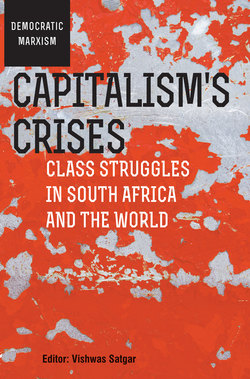Читать книгу Capitalism’s Crises - Alfredo Saad-Filho - Страница 23
На сайте Литреса книга снята с продажи.
The securitisation of democracy
ОглавлениеModern democracy is about a people’s history of struggle to limit the power of capital and broaden modern citizenship to embrace non-property holders, women, non-whites and immigrants. It is also the story about the democratisation of the US constitution, particularly after the French Revolution (Wood 2004). In essence, modern democracy, through its advocacy of rights, freedoms and forms (representative, direct, participatory and associative), has embodied an impulse against capitalism as the expression of the will of the people. At the same time, capitalism has generally involved a formal separation between the ‘political’ and the ‘economic’; the state and market are deemed separate and distinct spheres of society, which is specific to a capitalist society. But, in practice, state intervention is crucial to realising the systemic imperatives of the market (Wood 2003). Liberal ideology has further authorised this separation, so that democracy is understood as separate from corporate power and is necessary to protect the individual from the abuse of state power; thus democracy is ‘for the people and by the people’. In the US, liberal democracy has been undergoing fundamental changes over the past few decades. In theory and practice, democracy has been reduced to certain basic freedoms: the rule of law, separations of power and basic procedural performance, such as electing representatives by means of periodic elections. Money has also come to play a crucial role in determining representation and the ‘people’s representatives’.
At the same time, US foreign policy, both during and after the cold war, has trumpeted the virtues of the US liberal model as the standard of democracy for all to follow. This model has become a major export of the US superpower. With the demise of the Soviet Union, a wave of democratisation, including in Latin America, Africa, Asia and former Soviet Bloc countries, entrenched the US liberal model of democracy as the global standard (Robinson 1996). However, the nature of democracy coming to the fore in the US and other parts of the world is prompting serious questions about the character and content of the US democracy standard. Since President Reagan, US democracy has been firmly locked into a path of neoliberalisation, which has conjoined capitalism and democracy as market democracy. This has increased the power of corporations in the political system by allowing greater funding to political parties’ (effectively buying lobbying influence), and has reduced electoral politics to a media-driven marketing spectacle requiring large sums of money.11
In the meantime, since 9/11, national security concerns have trumped domestic democratic rights and freedoms. The sweeping powers claimed to fight terrorism domestically amounted to secret detentions, suspected American citizens being designated as ‘enemy combatants’ without any rights, the use of torture in anti-terror police work, scrutinising adherents to the Muslim faith, and the use of assassinations to deal with terrorists (Falk 2004). In this endless War on Terror, privacy has also been a casualty and has been undermined, domestically and internationally. This has been brought to the fore by WikiLeak’s revelations, as well as by whistleblowers like Bradley Manning and Edward Snowden (see Harding 2014; Leigh and Harding 2011). Moreover, the War on Terror has violated various international laws and standards, and has purely been driven by the logic that might is right. The illegal invasions of Afghanistan and Iraq, holding prisoners at Abu Ghraib without due process, the interrogation methods used by the Central Intelligence Agency on suspected terrorists, and the use of special killing squads and drone attacks have all raised questions about the nature of US democracy – and how it provides licence for wanton violence, gross abuses of power and violations of international law.
Basically, US democracy is securitised through two tendencies. First, it is narrowed by national-security imperatives, in which freedoms and rights do not matter if you are an enemy or suspected enemy in the endless War on Terror. National security trumps all due process and rights, for both American and non-American citizens. In other words, democracy has become militarised. Second, democracy has become securitised in the economic sense of ensuring that capital, particularly finance capital, prevails over democratic imperatives. Put differently, history has come full circle and so-called free markets are given more power through market democracy – a situation that is similar to the advent of industrial capitalism in Britain, when democracy did not exist. The economic securitisation of democracy ensures that market imperatives come to the fore to secure stability, technocratic forms of governance are strengthened, the power of the media is used to shape public opinion in the interests of markets, and dissent is disciplined through both market and coercive power.
In different parts of the world, the articulation between militarised and economic securitisation of democracy has been evident to different degrees, informed by national conditions and the degree of influence of the US. This democratic project, according to the US standard, has been happening through democratisation, regime change, new constitutionalism, for example in the European Union context,12 and through good-governance agendas – for example, in Africa. The securitisation of democracy, and its re-articulation as market democracy, has been about hollowing out democracy, reducing it to a formal electoral performance and presenting the undemocratic, hierarchical capitalist corporation as the custodian of democratic freedom. This has created a systemic crisis in which political systems are increasingly discredited and the gap between leaders and the led is widening, creating a legitimacy deficit. True democratic politics, driven by citizens, is being disabled and is in jeopardy. This systemic condition, in its intersection with the other dimensions of civilisational crisis, opens the way for new extreme right-wing nationalist, populist, religious-fundamentalist, authoritarian and even neo-Nazi forces to emerge, as disaffection and political alienation deepen on a global scale.
